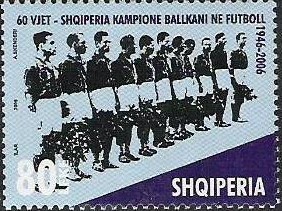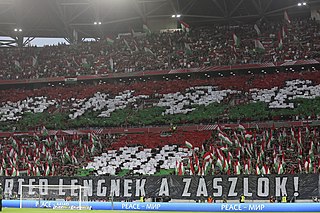The 1971–72 season of the European Cup Winners' Cup football club tournament was won by Rangers, who defeated Dynamo Moscow in the final.
The 1989–90 season of the European Cup Winners' Cup was won for the only time by Sampdoria in the final against Anderlecht, 2–0 at Nya Ullevi in Gothenburg, on 9 May 1990. They went on to win 1990–91 Serie A, also being runners-up in the 1991–92 European Cup and in the 1988–89 European Cup Winners' Cup. English clubs were still banned from Europe following the Heysel Stadium disaster, meaning Liverpool missed out on a place, but would have a representative again the following season.
The 2010 FIFA World Cup qualification UEFA Group 1 was a UEFA qualifying group for the 2010 FIFA World Cup. The group comprised 2006 fourth-place finishers Portugal, along with Sweden, Denmark, Hungary, Albania and Malta.
The 1966–67 Balkans Cup was an edition of the Balkans Cup, a football competition for representative clubs from the Balkan states. It was contested by 8 teams and Fenerbahçe won the trophy.
Standings and results for Group 6 of the UEFA Euro 1984 qualifying tournament.
Standings and results for Group 1 of the UEFA Euro 1988 qualifying tournament.
The qualification matches for Group 3 of the European zone (UEFA) of the 1994 FIFA World Cup qualification tournament took place between April 1992 and November 1993. The teams competed on a home-and-away basis with the winner and runner-up claiming 2 of the 12 spots in the final tournament allocated to the European zone. The group consisted of Albania, Denmark, Latvia, Lithuania, Northern Ireland, the Republic of Ireland and Spain.
This page shows the standings and results for Group D of the UEFA Euro 2012 qualifying tournament.
The qualifying rounds for the 2002–03 UEFA Champions League began on 17 July 2002. In total, there were three qualifying rounds which provided 16 clubs to join the group stage.
Standings and results for Group 2 of the UEFA Euro 2000 qualifying tournament.

Standings and results for Group 7 of the UEFA Euro 1996 qualifying tournament.
The 1989–90 season was FC Dinamo București's 41st season in Divizia A. In this season, Dinamo made the double, stopping Steaua's supremacy in Romania. In Europe, Dinamo reached the semifinals of the Cup Winners' Cup, where it is defeated by Anderlecht. It was a special season because of the Romanian Revolution of 1989. Dinamo dominated the first half of the season, winning the derby with Steaua, 3–0, on its ground. It was the first defeat for Steaua in the Romanian championship after 104 consecutive games. In the winter break, after the Revolution, Dinamo suffered administrative changes, for a few days having a different name – Unirea Tricolor.

The 1946 Balkan Cup was the 8th edition of this tournament. The participanting teams were Yugoslavia, Bulgaria, Romania and for the first time ever, Albania, who ended up winning the tournament in their first try.

The 1935 Balkan Cup was the sixth Balkan Cup football tournament. The national teams of Yugoslavia, Greece, Bulgaria and Romania took part and Yugoslavia won it. At the end of the tournament, Yugoslavia were declared winners because of their better goal average ; Bulgaria protested, stating that if the match between Yugoslavia and Romania had finished regularly, the former's goal record might have changed, but after a one-year procedure, the protest was rejected and Yugoslavia remained winners. The host of the tournament was Bulgaria. The top goal scorer was Ljubomir Angelov from Bulgaria with 6 goals in the form of two hat-tricks.
The 1948 Balkan Cup, officially called the Balkan and Central European Championship, was played between April and November 1948 between Albania, Romania, Bulgaria, Yugoslavia, Hungary, Poland and Czechoslovakia. It was Poland and Czechoslovakia's first and only participation in the tournament, which was not completed. Hungary was leading the table at the time it was abandoned.
The 2001–02 season was FC Dinamo București's 53rd season in Divizia A. In this season, Dinamo became Romanian champions for the 16th time in history. Dinamo was eliminated quickly from the UEFA Cup, and concentrated only on the internal competition. Thus, after the first half of the season, Dinamo was leader with two points over the revelation FC Național. In March 2002, Dinamo defeated Rapid 3–2, and distanced itself to five points at the front of the standings, and Cristian Borcea, Dinamo's president, launched after the game the famous sentence: "Let us prepare for the Champions League"
The 1931–1934 Central European Cup for Amateurs was the second and last edition of the Central European International Cup for amateur teams. It was won by Romania, who took part for the first and only time.

The Hungary–Romania football rivalry is a competitive sports rivalry that exists between the national football teams of the two countries and their respective sets of fans.
The qualifying round matches of the 1999–2000 UEFA Cup were played on 12 and 26 August 2000. The round consisted of 38 matches.
The 1964 Summer Olympics football qualification – Europe Group 1 was one of the five European groups in the Summer Olympics football qualification tournament to decide which teams would qualify for the 1964 Summer Olympics football finals tournament in Japan. Group 1 consisted of five teams: Albania, Bulgaria, Denmark, Luxembourg and Romania. The teams played home-and-away knockout matches. Romania qualified for the Summer Olympics football finals after defeating Bulgaria 3–1 on aggregate in the second round.



